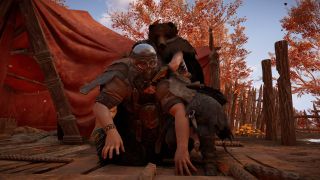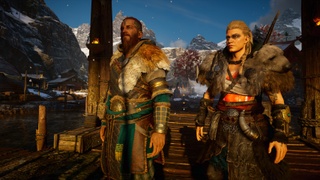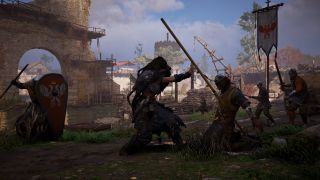Assassin's Creed Valhalla's female Eivor is the series' best protagonist
Sorry, Kassandra.
It's all about that growl. When Eivor talks, even when joking around with her mead-soaked comrades, there’s always an edge—a promise that, if shit goes down, she's ready to whip out her axe and start chopping off heads. It's a simmering ferocity that's with her at all times in Assassin's Creed Valhalla, and when a raspy, snarling threat doesn’t prove that she means business, that's when the whirlwind of destruction begins. I'm going to swoon again.
While I’ve yet to see the credits roll on Valhalla—it's approximately 10 million hours long—I’m still ready to call it: Eivor is Assassin's Creed's best protagonist. Desmond and Conner rightly get dunked on a lot, but otherwise it’s a series blessed with a lot of entertaining characters. Syndicate often gets forgotten, but Evie and Jacob were a wonderful odd couple, and then there's Odyssey’s Kassandra, who does tend to overshadow the rest. But now we've got Eivor.
There are actually two Eivors, male and female, but I’m only giving the title to the latter. Their lines are identical and they are essentially the same character, but the voice performances make a huge difference. Magnus Brunn lends his voice to male Eivor, and he's got plenty of experience from his stint playing Cnut (not that one) in The Last Kingdom. As Cnut, he was loud and energetic, all fired up and ready to screw over Danes and Saxons alike, but as Eivor he's a lot more restrained. His voice is softer and his tone is more thoughtful, and while it's a good performance, it doesn't feel like an entirely comfortable fit for the character.

Cecilie Stenspil's Eivor is also quite restrained, but in a way that suggests she could become unrestrained very quickly. Whichever version you play, this is not the popular image of a Viking berserker, but one that's a bit more nuanced. Eivor is a person first, and it's her relationships that define her more than her love of raiding and boozing. Some of these relationships hit harder, however, with female Eivor. The dynamic between Eivor and her brother, for instance, or Eivor's friendship with the village seer, feel meaningfully distinct, even though all the words are the same. When she helps another Dane root out a traitor and reclaim her settlement, there's this undercurrent of women fighting hard to succeed in a masculine society, and you just don't get that if you're playing as a burly guy with a beard.
That reading is based on something entirely unspoken. Valhalla presents the Danes as extremely egalitarian—there's plenty of evidence they were a lot more advanced in this regard than the Saxons, but this is a whole other level—and, like Odyssey, nobody cares if Eivor is a man or a woman. This erases issues that still exist today instead of confronting them, but there's also something to be said for being able to play a Viking game as a woman without being constantly reminded that some people don't think you should be able to do that.
9th century England is still undeniably full of people trying to out-macho each other, however, and to thrive in that world Eivor, and women like her, end up adopting a way of doing things that would be considered typical blokey behaviour, at least at the time. While Valhalla doesn't have anything explicit to say on the topic, as far as I've seen, it can't help but say things simply by being set in this period and by having a female protagonist.

So yeah, female Eivor all the way, with a tiny exception. Valhalla's default setting switches from female to male when the story calls for it, which is not all that often. Why and how it does this is deep spoiler territory, but the important thing is that the female version is the primary, canon protagonist, and you'll play her for 90 percent of the game. You can choose to play exclusively with just one of them, but I think it lessens the impact of an important story beat, so I recommend playing it on default as Ubisoft intended. And I'm increasingly convinced that this was the original plan, with the ability to play male Eivor for the whole game added to placate executives with a reputation for sidelining women. While Ubisoft has been pressured to start cleaning house, all the people who were fired or stepped down over accusations of sexism and workplace toxicity were around during Valhalla's development. So blame them if you're sick of me calling her "female Eivor" like I'm Quark.
The biggest gaming news, reviews and hardware deals
Keep up to date with the most important stories and the best deals, as picked by the PC Gamer team.
Despite their similarly gloomy origin story and talent for killing people, Eivor is not another Kassandra. Eivor is a leader, not a mercenary, and one that takes oaths and loyalty seriously. She's more authoritative, and less likely to crack a joke. While she's charismatic, she doesn't have Kassandra's easy-going, roguish charm, but I'm a bit sick of charming heroes that love their banter. Joss Whedon ruined it for everyone. I'd much rather a driven, sincere protagonist. And this is not a dry game. It's probably the silliest Assassin's Creed of the lot. A woman that sounds like Monty Python's Terry Jones lets you command her army of cats. You can feed a woman snake eggs to make her emit noxious gasses. It's weird. Eivor plays it straight and lets everyone else make a fool out of themselves, and occasionally she jumps in with a quick putdown or wry retort. Most of the time, though, she looks bemused.
Really, she reminds me of Geralt. Yes, I've tricked you into reading yet another PC Gamer article about our best boy. There are a lot of similarities though. I mean, one of the biggest ones is that Valhalla is the most Witchery thing I've played since The Witcher 3. Just look at this thing:

The tone and aesthetic all harken back to The Witcher 3, and throwing Eivor into the mix only solidifies it. She's not just Geralt with a big axe, but their gruff, I'm-done-with-this-shit demeanour makes them kindred spirits. Eivor's a lot more personable, though. She can turn off the gruffness and eagerly play with some kids, and she's got a lot of respect for people who Geralt would likely overlook. Her experiences are just more accessible and human, even if she often comes across as a stone cold hardass.
I'm not entirely convinced that she'll gain the longstanding popularity enjoyed by the likes of Geralt and Kassandra, though, even if she absolutely deserves it. Kassandra was immediately likeable, and Geralt's been developed over the course of multiple games, improving each time. Valhalla begins in freezing Norway, where you'll spend much of your time hoofing it over massive mountains with a stoic, quiet warrior that you've yet to become familiar with. It wasn't until I hit the warmer climes of England that I also warmed up to Eivor. Like a good friendship, you need to put in the time.
- Assassin's Creed Valhalla tips: Dominate 9th century England
- The best armour in Assassin's Creed Valhalla: Dress to kill
- Assassin's Creed Valhalla map: Never get lost in England or Norway again

Fraser is the UK online editor and has actually met The Internet in person. With over a decade of experience, he's been around the block a few times, serving as a freelancer, news editor and prolific reviewer. Strategy games have been a 30-year-long obsession, from tiny RTSs to sprawling political sims, and he never turns down the chance to rave about Total War or Crusader Kings. He's also been known to set up shop in the latest MMO and likes to wind down with an endlessly deep, systemic RPG. These days, when he's not editing, he can usually be found writing features that are 1,000 words too long or talking about his dog.
Most Popular


